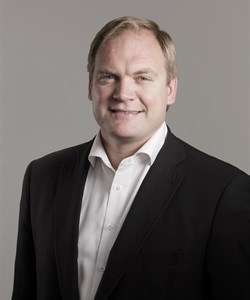#EntrepreneurMonth: Allan Gray Orbis Foundation on cultivating an entrepreneurial mindset

Holding a B.Bus.Sci in Finance as well as the CA(SA) and CFA qualifications, Farr worked in merchant banking in London prior to starting The Starfish Foundation, which mobilised resources for vulnerable and orphaned children in Johannesburg. Seeing Farr’s commitment to social change, Allan Gray approached him to head the Allan Gray Orbis Foundation.
Central to the Foundation’s work is the Schramm's Law approach, which suggests that the single most important contributor to a nation’s economic growth is the number of startups that grow to a billion dollars (or rand, in South Africa’s case) in revenue within 20 years. While South Africa currently produces approximately three of these businesses a year, the Foundation estimates that if the country were able to create 10 of these companies per year, it’d be able to change the growth of the economy by 1% per annum. Based on this prediction, there is still much work to be done…
 With various challenges and limitations facing South Africa, how does the country progress in entrepreneurship?
With various challenges and limitations facing South Africa, how does the country progress in entrepreneurship?
 With various challenges and limitations facing South Africa, how does the country progress in entrepreneurship?
With various challenges and limitations facing South Africa, how does the country progress in entrepreneurship?There was a useful exercise done recently, which tried to find the binding constraints in education. These are the issues that need to be addressed first, before anything else. When you apply this to entrepreneurship in South Africa, our binding constraint is the levels of our human capital. Because we’ve been failed by our education system generally, that is the root cause of our lack of entrepreneurial ability. The whole notion of being entrepreneurial is a higher order cognitive ability. The pinnacle of learning in Bloom’s Taxonomy is being creative, so if we aren’t even getting memory work and the basics right, we can’t build on that to the level of coming up with your own original ideas.
Second is the function of an entrepreneurial culture for society in general. There’s a lack of desire and lack of belief to pursue entrepreneurial ventures. Studies show that people have often chosen civil service jobs, which are seen as fixed opportunities. But this is increasingly changing, as we’re seeing more role models of successful entrepreneurs and there are more stories to be told. That starts to shift the culture. It’s easier to set the culture earlier in schools which provide activities that help normalise this entrepreneurial spirit.
 What ways has the Foundation found to shift the way we educate and train the youth to ensure that they can positively harness their potential and that as a society we reap the full youth dividend?
What ways has the Foundation found to shift the way we educate and train the youth to ensure that they can positively harness their potential and that as a society we reap the full youth dividend?
 What ways has the Foundation found to shift the way we educate and train the youth to ensure that they can positively harness their potential and that as a society we reap the full youth dividend?
What ways has the Foundation found to shift the way we educate and train the youth to ensure that they can positively harness their potential and that as a society we reap the full youth dividend?What we’ve found is that people underestimate their own ability. An entrepreneurial mindset is like a skillset that needs to be learnt and this can’t happen without practice. We’ve found that if you find ways to help people continually recognise different opportunities, it’s amazing how that generates a powerful level of self-belief. The system, in terms of education, is very much about rote-learning and predictive thinking, but we need to open people’s imagination and ability to create. The skillset people need is called effectual thinking.
The Foundation does this by encouraging scholars and fellows to come up with ideas on a monthly basis that identify an inefficiency and solve a problem in their context. They need not necessarily implement the solution then and there, but it’s to get them practising to come up with different solutions. Naturally, the more one does this, this becomes how one sees the world.
Another thing we’ve been looking at is an online platform, which we’ve called Blue Helix, that has entrepreneurial challenges. An example is ‘upcycler’, where you find something where you live and find several new uses for it, thus bettering it and ultimately upcycling it to serve a new purpose. People then take a photo of the product and submit it into a competition with other learners across the country. This is another way of normalising this behaviour.
 Since we’re in the midst of Global Entrepreneurship Week (GEW), what significance does it hold? What role does the Foundation play in the week?
Since we’re in the midst of Global Entrepreneurship Week (GEW), what significance does it hold? What role does the Foundation play in the week?
 Since we’re in the midst of Global Entrepreneurship Week (GEW), what significance does it hold? What role does the Foundation play in the week?
Since we’re in the midst of Global Entrepreneurship Week (GEW), what significance does it hold? What role does the Foundation play in the week?GEW started as a small event in the UK to promote entrepreneurship for a week. I wondered what difference only one week could make. But the week itself became a movement. It’s created a platform to amplify voices on entrepreneurship around the world, to showcase what’s going well in the world of entrepreneurship and to create an overarching global entrepreneurship network.




























